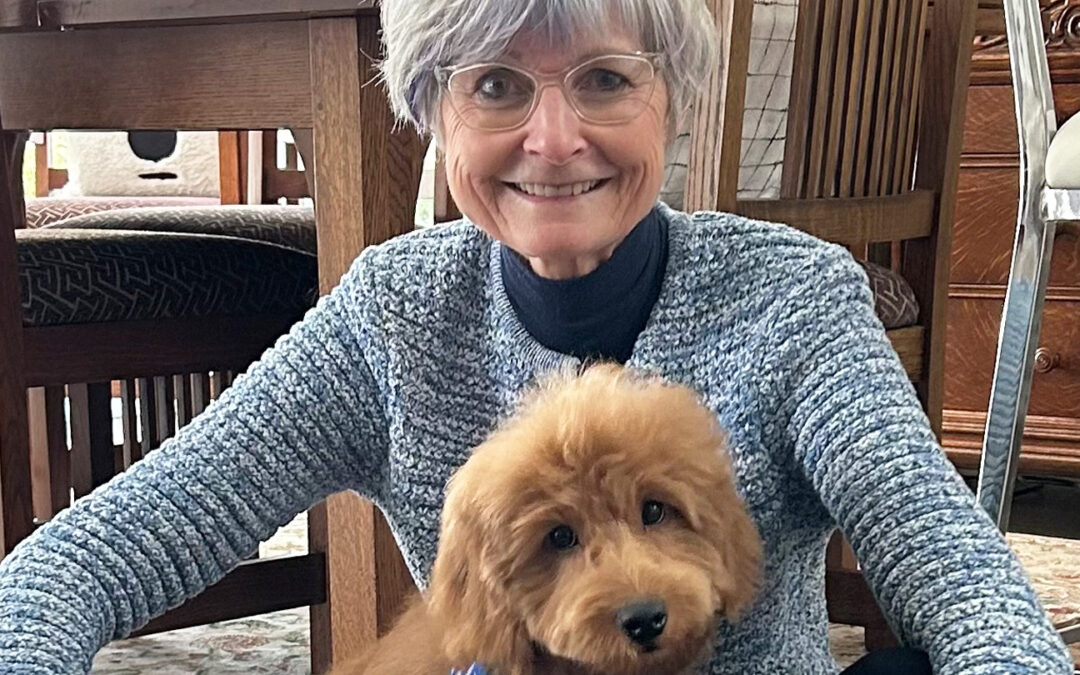We just brought a new puppy into our household. Our relatives were incredulous and my first cousins asked pointedly “why I would do such a thing?”
It is a fair question. After all I am transitioning from roles that required intensive full time leadership responsibilities into the world of consulting, seeking more freedom, less stress, no daily commute with a sprinkling of organizational challenges to stave off cognitive stagnation and give back.
Why indeed – as I am trying to “slip the surly bonds” of the routines of the workaday world – would I tether myself to Henry?
Henry is a 4-month-old mini golden doodle. Any brief periods as a consultant, where I didn’t know what was coming next? Those uneasy gaps of unpredictability which flow from the uncertain rhythm of consulting have disappeared with different routines. Henry was intended to be my new walking buddy and soak up my leftover love. But instead and more importantly, I have discovered that Henry has offered me an opportunity to apply 35 years of executive leadership experience (and validate the scars acquired in the management trenches).
The importance of training. My childhood pets — back in an era that was generally inattentive to pet management — were sadly ill-trained. How times have changed. Henry was sent to 6 weeks of puppy boot camp. He can sit on his “place cot” until summoned, void with consistency on a 4’ X 4’ square of pea stones in the backyard and sleep in his cozy crate overnight without a whimper. I have never appreciated more the value of training in organizational (read household) performance. Even family and friends are impressed.
Setting clear expectations. A 4-month-old puppy is exuberant and tends to nip. When I began to run out of band aids, I was reminded of the need for the leader of the pack to set boundaries. I also recalled that my in-the-moment mindset can frame my response. So, I am careful to check my emotional state before I clarify expectations and provide feedback firmly but never harshly or demeaning. Henry’s impulsive responses have largely disappeared as he has grown to understand my expectations.
Demonstrating confidence in team. The trainer told me that as Henry was still a baby he was often distracted from “heeling” properly. Initially I was tentative on our walks and had low expectations of his performance. Then one day my husband took Henry for a brisk walk – not allowing him to sniff and eat every leaf but rather assuming he would heel. It turns out Henry is a quick study at heeling – encouraged as well with kibble treats – which has turned our walks together into an enjoyable experience.
The importance of situational leadership. The situational leadership model developed by Paul Hersey and Ken Blanchard changed my approach to managing people 30 years ago. Effective leaders are those who can adapt their leadership style to the maturity or readiness level of their team members in a given situation. The model suggests that there is no one-size-fits-all response.
Henry’s confidence and competence are growing and changing with every week. I have learned that I have to give him more and different scope. I am now buying him more sophisticated toys for finding treats. I take him off-leash in the backyard and expect him to recall when beckoned. I will continue to observe, be flexible and respond as his maturity evolves.
Differing rewards. At the conclusion of his boot camp, I asked the trainer if I should continue to give Henry treats for performing basic functions such as toileting and sitting. Her response was very insightful: “Henry needs a job and when he does that job, he has come to expect a salary. Would you reduce his salary as he masters the job?”
Recently I have come to observe that Henry no longer needs a treat for voiding only on his gravel pad. But I give him treats for more complex accomplishments. He also responds to lavish praise and big hugs. Those come easily. Henry is adorable.
Expectations of Leadership. When Henry first joined our “pack,” I believed Henry would be the student and I would be the teacher. Now I conclude it’s the opposite. Henry is continually reminding me, testing limits and stretching my leadership capabilities. Even an old dog can learn new tricks.
Judy Fantham is a principal with The Osborne Group who relishes turnaround projects and interim executive roles with nonprofit organizations.






